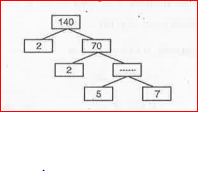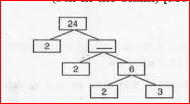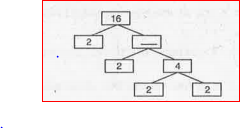Complete Solutions to EXERCISE of chapter REAL NUMBERS of Class 10 book with complete answers and questions
| Class 10 | MATHS |
| Chapter | REAL NUMBERS |
| MBD | EXERCISE |
| Number Of Questions | 83 |
| Academic Year | 2023-24 |
Use Euclid's division algorithm to find HCF of : 36,84
01:36View SolutionUse Euclid's division algorithm to find HCF of : 34,102
01:17View SolutionUse Euclid's division algorithm to find HCF of : 45,75
01:42View SolutionUse Euclid's division algorithm to find HCF of : 112,49
02:56View SolutionUse Euclid's division algorithm to find HCF of : 4052,12576
04:11View SolutionShow that every positive even integer is of the form 2q, for some integer q.
04:18View SolutionShow that every positive odd integer is of the form 2q + 1, for some integer q.
02:41View SolutionShow that every positive odd integer is of the form 4q + 1 or 4q + 3, where q is some integer.
04:03View SolutionA sweet seller has 420 kaju baths and 130 badam barfis. She wants to stack them in such a way that each stack has the same number and they take up the least area of the tray. What is the number that can be placed in each stack for this purpose ?
04:02View SolutionShow that one and only one out of p, p + 2 or p + 4 is divisible by 3.
06:02View SolutionRenu purchases two bags of fertiliser of weights 75 kg and 69 kg. Find the maximum value of weight which can measure the weight of the fertiliser exact number of times.
02:28View SolutionTwo tankers contain 434l and 465 litres of diesel respectively. Find the maximum capacity of a container that can measure the diesel of two tankers exact number of times.
02:45View SolutionHotel 'A' has 560 tables. Hotel `B' has 400 tables. In each Hotel, the tables are arranged in rows with the same number of tables in each row. What is the greatest possible number of tables in each row in the two hotels ?
03:05View SolutionUse Euclid's division algorithm to find the HCF of 420 and 130.
02:01View SolutionExpress each number as a product of its prime factors : 32760
01:57View SolutionExpress each number as a product of its prime factors : 404
00:44View SolutionExpress each number as a product of its prime factors : 120
01:06View SolutionExpress each number as a product of its prime factors : 825
01:28View SolutionExpress each number as a product of its prime factors : 2658
01:02View SolutionFind the LCM and HCF of the following pairs of integers and verify that LCM `xx` HCF = Product of the two numbers. : 96 and 404
04:29View SolutionFind the LCM and HCF of the following pairs of integers and verify that LCM `xx` HCF = Product of the two numbers. : 625 and 1025
04:28View SolutionFind the LCM and HCF of the following pairs of integers and verify that LCM `x` HCF = Product of the two numbers. : 441 and 539
05:00View SolutionFind the LCM and HCF of the following pairs of integers and verify that LCM `xx` HCF = Product of the two numbers. : 385 and 2275.
03:49View SolutionFind the LCM and HCF of the following integers by applying the prime factorisation method : 15, 25 and 30
02:19View SolutionFind the LCM and HCF of the following integers by applying the prime factorisation method : 12, 16 and 28
02:39View SolutionFind the LCM and HCF of the following integers by applying the prime factorisation method : 70, 105 and 175
02:42View SolutionFind the LCM and HCF of the following integers by applying the prime factorisation method : 91, 112 and 49
02:34View SolutionFind the LCM and HCF of the following integers by applying the prime factorisation method : 12, 45 and 75
02:03View SolutionFind the LCM and HCF of the following integers by applying the prime factorisation method : 6, 72 and 120
04:57View SolutionFind HCF (96, 404) if LCM (96, 404) = 9696.
02:13View SolutionIf HCF (6, 20) is 2, then find LCM (6, 20).
01:16View SolutionCheck whether `4^n` can end with the digit 0 for any natural number n.
04:23View SolutionThe Traffic lights at three different road crossings change after every 48 seconds, 72 seconds and 108 seconds respectively, If they change simultaneously at 7 am at what time will they change simultaneously again ?
03:51View SolutionThree boys step off together from the same spot. Their steps measure 63 cm, 70 cm and 77 cm respectively. What is the minimum distance each should cover so that all can over the distance in complete steps ?
03:52View SolutionFind the least number which when divided by 6, 15 and 18 leave remainder 5 in each case.
03:28View SolutionCheck whether `3^n` can end with the digit 0 for any natural number n.
03:52View SolutionExplain` 5 xx 4 xx 2 xx 1+ 5 and 17 xx 15 xx 13 xx 11 xx 9 xx 7 xx 5 xx 3 xx 1+7` are composite numbers.
05:17View SolutionEvery composite number can be expressed (factorized) as a product of primes.
04:06View SolutionProve that `5-sqrt3` is irrational.
02:39View SolutionShow that `3sqrt2` is irrational.
02:26View SolutionShow that following are irrational. : `sqrt11`
06:28View SolutionShow that following are irrational. : `sqrt13`
04:59View SolutionShow that following are irrational. : `sqrt7`
03:38View SolutionShow that following are irrational. : `sqrt15`
04:24View SolutionProve that`5+sqrt2` is irrational.
02:15View SolutionProve that`(2sqrt3)/(3)` is irrational.
02:01View SolutionProve that`(2sqrt7)/(sqrt11)` is irrational.
02:47View SolutionProve that`(sqrt5)/(3sqrt3)` is irrational.
02:45View SolutionProve that`(2)/(sqrt12)` is irrational.
01:44View SolutionProve that`2-sqrt3` is irrational.
02:35View SolutionProve that`sqrt5+1` is irrational.
08:15View SolutionProve that `5-sqrt3` is irrational.
04:39View SolutionWithout actually performing the long division, state whether the following rational numbers will have a terminating decimal expansion or a non-terminating repeating decimal expansion : 2/7 .
01:07View SolutionWithout actually performing the long division, state whether the following rational numbers will have a terminating decimal expansion or a non-terminating repeating decimal expansion : 14/11 .
01:17View SolutionWithout actually performing the long division, state whether the following rational numbers will have a terminating decimal expansion or a non-terminating repeating decimal expansion : 27/8 .
01:18View SolutionWithout actually performing the long division, state whether the following rational numbers will have a terminating decimal expansion or a non-terminating repeating decimal expansion : 35/16 .
01:27View SolutionWithout actually performing the long division, state whether the following rational numbers will have a terminating decimal expansion or a non-terminating repeating decimal expansion : 47/9 .
01:24View SolutionWithout actually performing the long division, state whether the following rational numbers will have a terminating decimal expansion or a non-terminating repeating decimal expansion : 6/11 .
01:15View SolutionWrite down the decimal expansion of those rational numbers which have terminating decimal expansions : 43/20 .
00:47View SolutionWrite down the decimal expansion of those rational numbers which have terminating decimal expansions : `411/((2)^4)` .
04:33View SolutionWrite down the decimal expansion of those rational numbers which have terminating decimal expansions : `35/((3)^2(11))` .
03:12View SolutionWrite down the decimal expansion of those rational numbers which have terminating decimal expansions : `2157/(5)^4` .
04:49View SolutionWrite down the decimal expansion of those rational numbers which have terminating decimal expansions : `349/((3)^2(10)^3(11))` .
04:28View SolutionThe following real numbers have decimal expansions as given below. In each case decide whether they are rational or not.If they are rational, and of the form `p/q` what can you say about the prime factors of q ? : 58.567823 .
03:16View SolutionThe following real numbers have decimal expansions as given below. In each case decide whether they are rational or not.If they are rational, and of the form `p/q` what can you say about the prime factors of q ? : `0.003bar352` .
03:54View SolutionThe following real numbers have decimal expansions as given below. In each case decide whether they are rational or not.If they are rational, and of the form `p/q` what can you say about the prime factors of q ? : 15712121212….. .
01:41View SolutionThe following real numbers have decimal expansions as given below. In each case decide whether they are rational or not.If they are rational, and of the form `p/q` what can you say about the prime factors of q ? : 8.652365236523 .
04:06View SolutionThe following real numbers have decimal expansions as given below. In each case decide whether they are rational or not.If they are rational, and of the form `p/q` what can you say about the prime factors of q ? : `0.bar54`
04:51View SolutionThe following real numbers have decimal expansions as given below. In each case decide whether they are rational or not.If they are rational, and of the form `p/q` what can you say about the prime factors of q ? : 0.00026 .
04:52View SolutionComplete the prime factor tree :
 .02:20View Solution
.02:20View SolutionComplete the prime factorization tree :
 .02:15View Solution
.02:15View SolutionComplete the prime factorization tree :
 .02:32View Solution
.02:32View SolutionComplete the prime factorization tree :
 .01:51View Solution
.01:51View SolutionEvery composite number can be (factorised) as a product of primes. True or False
01:52View Solution`sqrt5` is an irrational number.
07:09View Solution`2sqrt3` is an irrational number.
02:27View Solution3 is a rational number.
02:54View Solution`3sqrt2` is an ________ number.
01:09View Solution`sqrt14` is an ______ number .
01:39View SolutionHCF of 64 and 96 will be ______ .
02:38View SolutionHCF of 56 and 98 will be ________ .
02:04View Solution140 is written as the product of factors in the form ________ .
00:52View Solution150 is written as the product of factors in the form _________.
00:48View Solution
EXERCISE questions and complete solutions for chapter REAL NUMBERS of MBD of Class 10
